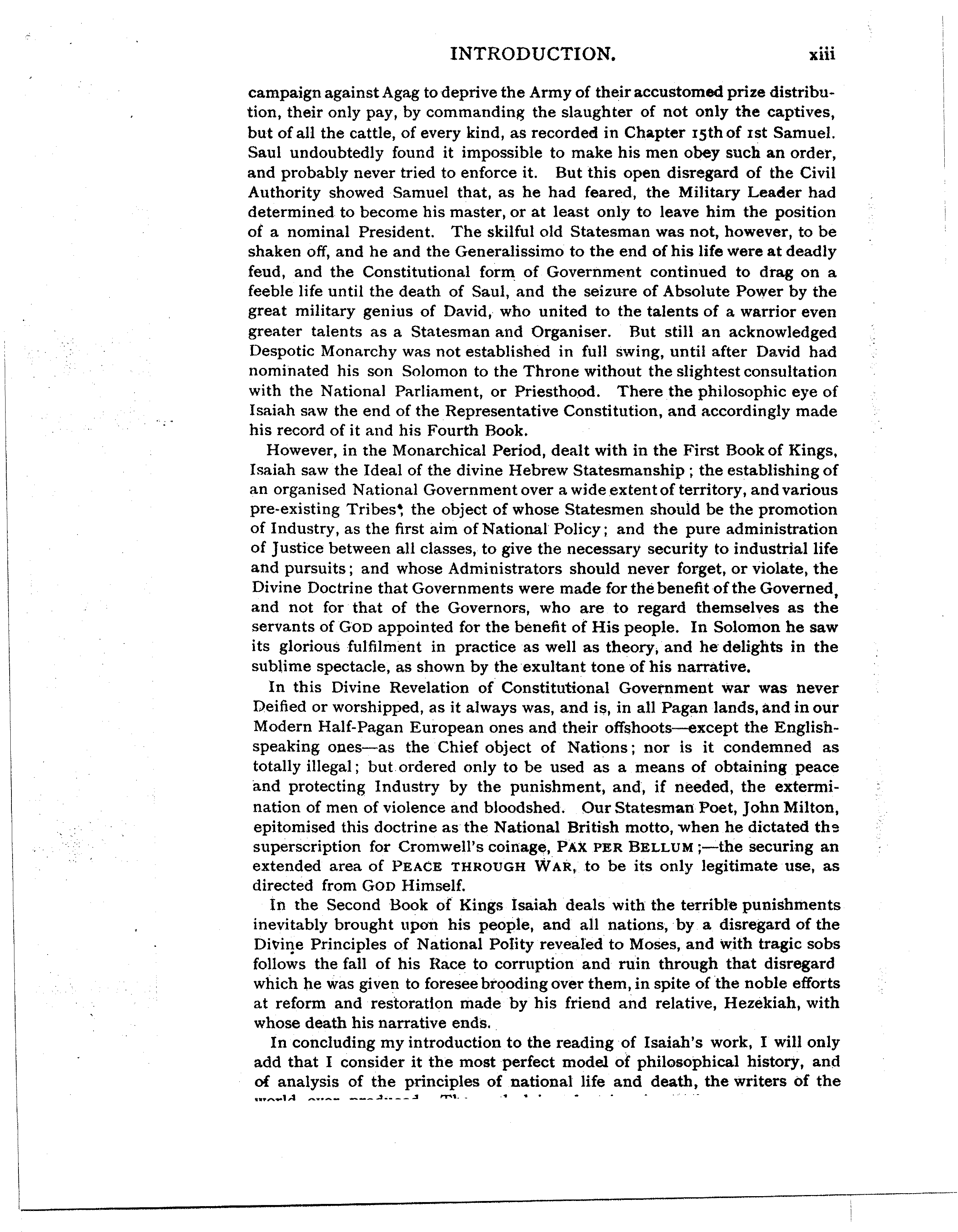Deuteronomy (The Speeches of Moses) - Ferrar Fenton Bible Translation page 220
The Five Books of Moses
campaign against Agag to deprive the Army of their accustomed prize distribu· tion, their only pay, by commanding the slaughter of not only the captives, bu-t of all the cattle, of every kind, as recorded in Chapter 15th of rst Samuel. Saul undoubtedly found it impossible to make his men obey such an order, and probably never tried to enforce it. But this open disregard of the Civil Authority showed Samuel that, as he had feared, the Military Leader had determined to become his master, or at least only to leave him the position of a nominal President. The skilful old Statesman was not, however, to be shaken off, and he and the Generalissimo to the end of his life were at deadly feud, and the Constitutional form of Government continued to drag on a feeble life until the death of Saul, and the seizure of Absolute Power by the great military genius of David, who united to the talents of a warrior even greater talents as a Statesman and Organiser. But still an acknowledged Despotic Monarchy was not established in full swing, until after David had nominated his son Solomon to the Throne without the slightest consultation with the National Parliament, or Priesthood. There the philosophic eye of Isaiah saw the end of the Representative Constitution, and accordingly made his record of it and his Fourth Book. However, in the Monarchical Period, dealt with in the First Book of Kings,
Isaiah saw the Ideal of the divine Hebrew Statesmanship ; the establishing of an organised National Government over a wide extent of territory, and various preexisting Tribest the object of whose Statesmen should be the promotion of Industry, as the first aim of National Policy; and the pure administration of justice between all classes, to give the necessary security to industrial life and pursuits; and whose Administrators should never forget, or violate, the Divine Doctrine that Governments were made for the benefit of the Governed_ and not fortthat of the Governors, who are to regard themselves as the servants of Gon appointed for the benefit of His people. In Solomon he saw its glorious fulfilment in practice as well as theory, and he delights in the sublime spectacle, as shown by theexultant tone of his narrative. In this Divine Revelation of Constitutional Government war was never
Deified or worshipped, as it always was, and is, in all Pagan lands, and in our Modern Half-Pagan European ones and their offshoots———except the English- speaking ones-—-as the Chief object of Nations; nor is it condemned as totally illegal; butordered only to be used as a means of obtaining peace and protecting lndustry by the punishment, and`, if needed, the extermi- nation of men of violence and bloodshed. Our Statesman Poet, john Milton, epitomised this doctrine as the National British motto, when he dictated the superscription for Cromwell’s coinage, PAX PER BELLUM ;——-·the securing an extended area of PEACE rmtoucm WAR, to be its only legitimate use, as directed from GOD Himself. In the Second Book of Kings Isaiah deals with the terrible punishments
inevitably brought upon his people, and all nations, by a disregard of the Divine Principles of National Polity revealed to Moses, and with tragic sobs follows the fall of his Race to corruption and ruin through that disregard which he was given to foresee brooding over them, in spite of the noble efforts at reform and restoration made by his friend and relative, Hezekiah, with whose death his narrative ends. In concluding my introduction to the reading of Isaiah’s work, I will only
add that I consider it the most perfect model of philosophical history, and of analysis of the principles of national life and death, the writers of the AAA ...·-.. ---.:.---1 rv--.
